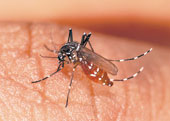 |
| FEVER ALERT: A mosquito feeds on human blood. A Telegraph picture |
Recent malaria deaths in the city can be blamed on the changing behavioural pattern of the parasite, according to experts.
Studies by Centre for Tropical Medicine and Parasitology (Centromap) and Allergy and Asthma Research Centre (Aarc) have revealed drastic changes in the manifestations of tropical diseases. New diseases have also been identified.
“Several factors are leading to bizarre manifestation of diseases. A project is being started on emerging trends in tropical diseases,” said Amitabha Nandy, a specialist in tropical medicine and parasitic diseases and director of Centromap.
The two organisations held a seminar in the city on Sunday on tropical diseases’ immunology. It was presided over by S.K. Audhya of Centromap and S. Chanda of Aarc.
Ruma Raha Chowdhury, director of postgraduate studies in clinical neuroscience at University of Cambridge, spoke on the role of genes in communicable diseases.
Centromap experts stated at the seminar that the relatively non-fatal malaria parasite, plasmodium vivax, is now causing severe infections, affecting the brain, lungs, intestine, blood and kidney.
“Five years ago, the same virus used to affect only the blood cells. Now, cases are being reported where the clinical manifestation of the plasmodium vivax parasite resembles more virulent and life-threatening infections caused by plasmodium falciparum parasites,” explained Nandy.
Since the symptoms at times are the same, doctors are finding it difficult to differentiate between fatal and non-fatal malaria.
Studies have also identified erratic immune response of the human body to various micro-organisms, which determines the clinical outcome of an infection.
The experts also spoke on how man-made changes in the environment caused climate changes, resulting in increased breeding of insect vectors.
The researchers revealed there has been a change in pattern for dengue, too. “Earlier, dengue was a disease that predominantly occurred in monsoon or before that. Now, cases of dengue are reported all year,” said a specialist from Indian Council of Medical Research, Calcutta.This, according to him, is due to several environmental and social factors.











